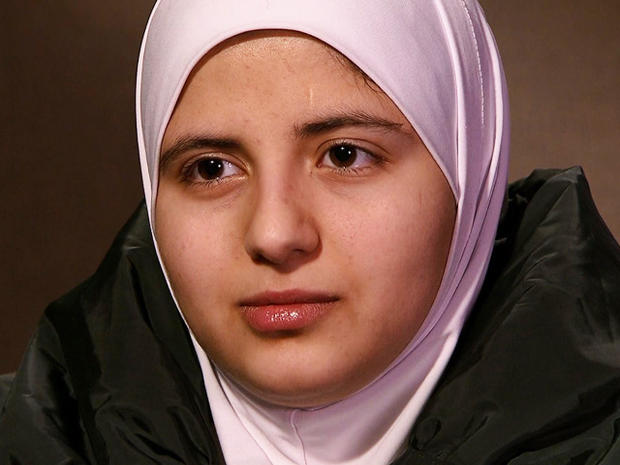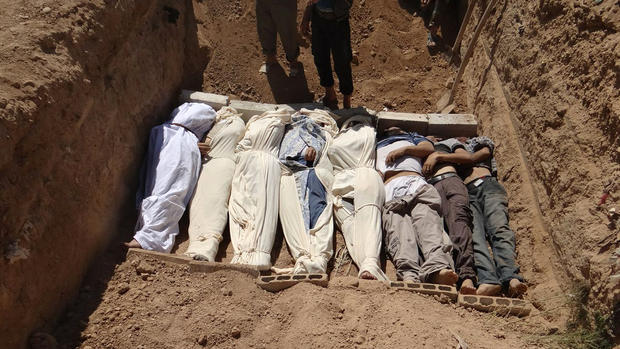Survivor of Syrian poison gas massacre still feels psychological effects
Updated Feb. 7, 12:47 p.m. ET
WASHINGTON -- The U.N. Security Council told Syria's President Bashar Assad on Thursday to speed up the removal of its chemical weapons. Syria missed a deadline Wednesday and has turned over less than five percent of its most dangerous chemicals.
Last summer, the regime promised to give up the weapons to
avoid a U.S. military strike after attacking civilians with poison gas in two
towns near Damascus, killing 1,400 people.
Sawan, a survivor of the devastating chemical weapons attack outside
Damascus last August, came to Capitol Hill to plead for U.S. help. She left bitterly disappointed.
“We are human! We are dying,” she told a group of reporters. Sawan told CBS News the deal to remove Assad’s chemical arsenal in exchange for calling off a possible U.S. missile strike -- celebrated as a diplomatic breakthrough -- has done nothing to stop the bloodshed.
State Department spokeswoman Jen Psaki responded, saying in an email, "We are glad these survivors are here in Washington to tell their stories on Capitol Hill and on the public stage. They will also be meeting with State Department officers as part of our engagement with a broad cross section of Syrians to better understand the situation on the ground."
This January, the United
Nations stopped counting the dead in Syria's civil war after toll reached more than 130,000 people.
“The
international world, is like yeah, we did something, we asked Assad to turn
over chemical weapons. It's their victory (Assad regime’s), not our victory.
It's their victory.”
“It was
crowded with people, on the floor, people trying to help, mourning, shouting,
people running back and forth -- it was like, I can't describe it, it's horror.”
While
she tried to help the victims strip down and remove the gas-soaked clothing,
she described how their bodies began to shake uncontrollably and blood began
dripping from their noses. She tried to focus on reviving the infants among the
crowd.
She
watched as friends succumbed to the poisonous sarin gas. The fumes left her
blind for nearly a week. While she no longer physically feels the effects of
the chemicals, Sawan said that mentally and psychologically it haunts her. The
emotion in her voice made that clear.
“We were used to death; we see the blood, we see the wounded, but those people were like sleeping, they were dying, they were dead,” she said. Sawan is frustrated that no world power has intervened to stop the killing.
“We were dying before the
chemical weapons, and during it, and after it,” she said angrily.
“For
God’s sake! So let him kill us by shelling, it’s okay? Kill us by hunger, it’s
fine? Let him kill us by MiGs and missiles, and all that, its fine? Just the
chemical weapons, is that the idea?”
At
least many of the victims of the chemical attack where asleep when it happened.
That, she said, was preferable to some of Assad’s recent brutal tactics.
Sewan described a brief moment of hope this Fall -- followed by deep disappointment -- after the U.S. considered, and then decided against launching missile strikes to punish Assad for using chemical weapons. “We discovered they were joking,” she said. “We lost their trust. They’re all liars.”
Yet Heba Sawan’s suffering
began long before the chemical attack. Her father was arrested by Assad’s army
over two years ago. She has not heard from him since. Her fiance -- a rebel
fighter -- was killed on their wedding day. When she went to visit his grave
days later, she was injured by shrapnel. Scars are still visible on her hands
and arms.
Her
town of Moudimiya has been under siege for more than a year. No one is allowed
in or out, including humanitarian relief groups delivering food. She said that
one of the most difficult things was to witness the starving children, who went
door to door in her town begging for food.
“People knocked at your door, kids, especially kids, asking for rice, wheat, and then you have that conflict, that if I gave him what I have my family will die,” she teared up. “So you may close the door, and you start crying; sorry baby, I cannot give you anything.”
Sawan said her six-year-old cousin starved to death. Others are doing anything to survive. “People ate everything. They eat leaves off the trees. They eat, even the expired food, and healthy food, everything is eatable, everything became eatable,” she trailed off.
“Some families, I know
that, they only eat olives for weeks. Only olives.”
In October,
the Assad regime allowed women and children under age 13 to evacuate from Moudimiya.
Men of fighting age -- like Heba Sawan’s 17-year-old brother -- were not
allowed to leave.
Sawan
wants the world to know that the suffering continues in her town. She believes
that she survived the chemical attack in order to share her story. The
Western-backed Syrian opposition paid her way to the U.S. so that she could do
that.
So far,
she has been discouraged that U.S. officials are focused solely on providing
humanitarian aid. “We need justice,” she implored. “After 3 years, I don’t
know what they are waiting for.”


